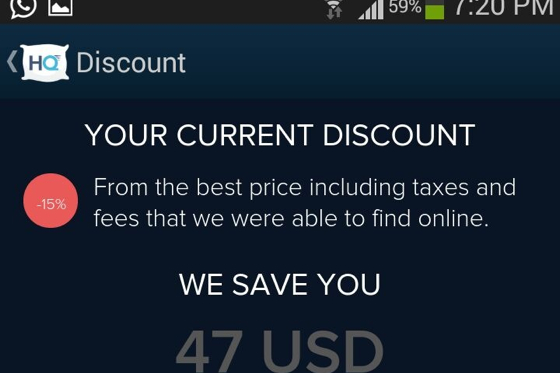Booking a room via a last-minute hotel booking app has its share of thrills, but for consumers who don’t like to rush, there is some respite. Apps are showing signs of increasing the booking window for such transactions.
Interesting developments are taking place outside the United States, too. This month, Asian mobile specialist HotelQuickly, an app with more than 300,000 downloads, introduced its “tomorrow-booking” feature.

Singapore-based Jeannette Ho, vice president of revenue management and analytics at FRHI Hotels & Resorts, isn’t really surprised with such developments. She said it’s inevitable that with mobile’s ability to reach travelers 24-7, ease of managing trip itineraries, convergence with mobile wallet and mobile-specific content by suppliers, more travelers will find it increasingly easy to complete a travel booking transaction on the go.
Adjustment by hoteliers
Of course, as the booking window associated with mobile apps evolves, it would also call for improvisation.
“For hotels, this means that the mobile channel is no longer focused on selling leftover last-minute inventory but instead moves toward being more mainstream with longer length of stay, too,” Ho said. “As a result, pricing would need to reflect this and be on parity with brand.com.”
At the same time, Ho stressed that mobile still lends itself best to less complicated purchases. As a result, rooms only, limited choices or simple packages with breakfast and business amenities would work best.
From an app’s perspective, HotelQuickly is striving to keep it simple. The focus is on letting a user complete a transaction in less than a minute and highlighting the savings. When checking the availability for a 5-star property in mid-July, HotelQuickly showed a saving of US$47 over the best price on the Internet (which was US$313.50).
The team at HotelQuickly cautions that one shouldn’t expect such deals in case the booking window increases. “We are focused on the last-minute segment only, meeting demand for unfilled rooms,” said Raphael Cohen, co-founder and chief sales officer, HotelQuickly. “Of course, a mobile app can also feature rooms, say for a week in advance, but then hotels won’t be able to offer the sort of discounts that are being offered now.”
Cohen added, “[We are here] to help hotels sell effectively whatever rooms they have left for the day. Rate parity does not apply for HotelQuickly as we are different from OTAs, so we give more flexibility to hotels on their pricing strategy.”
For example, hotels are rearranging deals daily or sometimes even intra-day based on occupancy and availability.
Unwilling participants
Despite flexibility promised by apps, even today there are hotel executives who aren’t willing to be a part of such models. For instance, Onyx Hospitality Group, Bangkok, is currently pursuing a device-agnostic rate and availability strategy. In fact, the revenue management team doesn’t forecast the demand separately by device.
“We aren’t associated with any mobile-only booking platform,” said Chetan Patel, Onyx’s vice president of strategic marketing and e-commerce.
Patel said this approach doesn’t fall in line with the chain’s revenue-management strategy. “Our hotels do feature on OTA-owned mobile apps, but we don’t offer any special rate for any channel,” he said. “We did try this out and found that it cannibalized our existing bookings.”
What’s next?
Rather than just focusing on discounted room bookings, apps need to come across as a smart assistant. The hotel apps need to know the industry and its users better. Mobile has a lot of leg — not only at the first booking stage, but also in terms of upselling and selling ancillary offerings throughout a transaction lifecycle.
As FRHI’s Ho pointed out, with current analytics capabilities, hotels are seeking platforms to offer more personalized and curated products. Apps need to respond to the needs of travellers as per the phase of their journey.
But a lot of work still needs to be done. Apps are trying to analyze the time of the day, tracking location and more and accordingly display customized deals.
Once this becomes mainstream, mobile apps won’t be just about rushing out for last-minute bookings.
Contributed by By Ritesh Gupta, Delhi, India
